
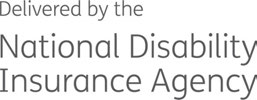 Our reference:
Our reference: FOI 24/25-0433
GPO Box 700
Canberra ACT 2601
1800 800 110
30 May 2025
ndis.gov.au
Mark Pietsch
Right to Know
By email: xxxxxxxxxxxxxxxxxxxxxxxxxx@xxxxxxxxxxx.xxx.xx
Dear Mark Pietsch
Freedom of Information request — Notification of Decision
Thank you for your correspondence of 02 October 2024, in which you requested access to
documents held by the National Disability Insurance Agency (NDIA), under the
Freedom of
Information Act 1982 (FOI Act).
The purpose of this letter is to provide you with a decision on your request.
Scope of your request
You have requested access to the following documents:
“Dear Freedom of Information Officer,
I am writing to request access under the Freedom of Information Act 1982 to documents
held by the National Disability Insurance Agency (NDIA) pertaining to the activities of the
NDIA Audit & Risk Committee from June 2023 to the current date.
Specifically, I seek access to the following:
1. Al reports prepared by the NDIA Audit & Risk Committee.
2. Minutes of meetings and actions taken by the NDIA Audit & Risk Committee.
3. Directions issued by the NDIA Audit & Risk Committee.
4. Any records of communication (including emails, memos, and written
correspondences) pertaining to the Committee’s role in reviewing and providing advice to
the Board on the following aspects:
Financial reporting.
Performance reporting.
Systems of risk management
Systems of internal control and administrative performance.
L\357944012.3
1
These documents are sought to understand and review the adequacy and
appropriateness of the Agency's systems and practices in the areas mentioned, in line
with the PGPA Act 2013.”
For ease of reference, I have numbered the specific types of documents you seek access to
from 1 to 4.
Processing period
We have been experiencing processing delays and were not able to provide you with our
decision by the due date. Consequently, we are deemed to have refused your application
under section 15AC of the FOI Act. I sincerely apologise for the delay in releasing this
decision to you.
We have continued processing your request. In the interests of not causing any further
delays, I have decided not to apply for an extension to the processing period from the Of ice
of the Australian Information Commissioner (OAIC) under section 15AC of the FOI Act to
protect your internal review rights. However, you may stil apply for an external review of the
Agency's decision with OAIC (although you may also need to apply to OAIC for an extension
of time in circumstances where we understand that you have not to date applied for OAIC
review of the Agency's deemed refusal decision). Please see
Attachment B for more
information about your rights of review.
Decision on access to documents
I am authorised to make decisions under section 23(1) of the FOI Act. My decision on your
request and the reasons for my decision are set out below.
I have identified 21 documents, which fall within the scope of point 2 your request. No
documents were found within scope of items 1, 3 and 4 of your request in circumstances
where the NDIA Audit and Risk Commit ee does not prepare reports or issue directions and
nor does it provide written advice to the Board on matters relating to financial reporting,
performance reporting, systems of risk management and/or systems of internal control and
administrative performance.
These 21 documents were identified by conducting searches of NDIA’s systems, using all
reasonable search terms that could return documents relevant to your request, and
consulting with NDIA staf in the Board & Governance team, Ecosystem Reform &
Governance Branch, Government Division who have the responsibility for the Secretariat
function of the Risk and Audit Committee.
L\357944012.32
I have decided to grant access to:
• 8 documents in full; and
• 13 documents in part.
In reaching my decision, I took the following into account:
• your correspondence outlining the scope of your request
• the nature and content of the documents falling within the scope of your request
• the FOI Act
• the FOI Guidelines published under section 93A of the FOI Act
• consultation with relevant NDIA staff
• factors relevant to my assessment of whether or not disclosure would be in the public
interest
• the NDIA’s operating environment and functions.
Reasons for decision
Irrelevant material (section 22)
Documents 18-21 are minutes of the NDIA Board, and as such they comprise information
that, for the most part, does not relate to the activities of the NDIA Audit & Risk Committee
and is accordingly not within the scope of your request.
Given I was satisfied that it was reasonably practicable to prepare an edited copy of
Documents 18-21, I have deleted all material that is out of scope of your request in
accordance with s 22 of the FOI Act.
Legal Professional Privilege (section 42)
Section 42(1) of the FOI Act provides:
A document is an exempt document if it is of such a nature that it would be privileged
from production in legal proceedings on the ground of legal professional privilege.
Parts of documents 1, 4, 5, 9, 15, 16 and 17 comprise summaries of internal legal advice
provided by lawyers employed by the NDIA (working within the Governance, Risk and Legal,
and Risk & Integrity teams) to the NDIA commit ees and Board. I am satisfied that these
communications were made in the context of a legal adviser - client relationship,
confidentially, and for the dominant purpose of giving or receiving legal advice. In particular, I
L\357944012.33
am satisfied that the lawyers, while employed by the NDIA, were acting independently from
the committees and Board. The role of these legal advisors in the meetings to which the
relevant documents relate was limited and they are not listed as being members of either the
Audit & Risk Commit ee or the Board. The advice was provided in their capacity as legal
advisors who advise a range of areas of the agency as required. I am satisfied that these
documents are subject to legal professional privilege, and that they would be privileged from
production in legal proceedings on this basis.
I am also satisfied that the NDIA has not waived its claim of privilege in relation to the legal
advice contained in these documents. That is because these documents have not otherwise
been disclosed outside of the agency (and within the agency have only been disclosed to
specific individuals as required).
I am satisfied that real harm would be occasioned if the content of the legal advice was
disclosed, and also if the Board and NDIA commit ees could not be confident of their ability
to receive independent legal advice in meetings without it being disclosable in response to
FOI requests.
Further, I am satisfied that these documents are not 'operational information' as defined in s
8A of the FOI Act.
Accordingly, I have determined that parts of these documents are exempt pursuant to s
42(1) of the FOI Act.
Commonwealth – State relations (section 47B)
Section 47B of the FOI Act relevantly provides:
A document is conditionally exempt if disclosure of the document under this Act:
(a) would, or could reasonably be expected to, cause damage to relations
between the Commonwealth and a State; …
I am satisfied that particular passages in documents 1, 9 and 15 contain information that, if
disclosed, would, or could reasonably be expected to, cause damage to relations between
the Commonwealth and a State. In particular, I consider that disclosure of the information
would adversely affect the level of trust and co-operation in existing relationships between
the agency and the Department of Social Services and its State counterparts. That is
because it would disclose frank observations made about a State's timely compliance with
financial obligations in relation to the NDIS Scheme. It may impair or prejudice the future
L\357944012.34
flow of information from that State to the Commonwealth and may impede the ability of the
agency and the Department of Social Services to effectively negotiate and maintain its
working relationship with that State, including in relation to the NDIS Scheme. Notably, the
NDIS Scheme continues to require ongoing cooperation between the Commonwealth and
States. In this respect, the disclosure would also adversely affect the administration of a
continuing Commonwealth-State project.
Accordingly, I am satisfied that these passages are conditionally exempt pursuant to s
47B(a) of the FOI Act.
In considering whether access to the conditionally exempt material would be contrary to the
public interest for the purposes of s 11A(5) of the FOI Act, I acknowledge that there are
factors favouring access to the material, including that disclosure may:
• promote the objects of the FOI Act by giving the Australian community access to
information held by government and promoting representative democracy by
increasing scrutiny, discussion, comment and review of government activities;
• potentially inform public debate on a matter of public importance; and
• potentially promote effective oversight of government expenditure on the NDIS
program and in relation to the agency.
I consider that public interest factors weighing against disclosure of the conditionally exempt
material include that disclosure:
• would adversely affect the level of trust and co-operation in existing relationships
between the agency and the Department of Social Services and its State
counterparts;
• wil adversely affect the operations of current Commonwealth-State mutual projects
and the development of future mutual projects; and
• will impede the ability of agency officers to provide detailed information and analysis
to relevant stakeholders in relation to matters of significant public importance,
including financial matters associated with the NDIS Scheme, and in particular by
reference to States/Territories.
In weighing up the public interest for and against disclosure, I have not taken into account
the irrelevant factors outlined in s 11B(4) of the FOI Act.
L\357944012.35
On balance, I consider that given the significant adverse impacts that disclosure of the
conditionally exempt information would have, both on Commonwealth-State relations and
current mutual projects and on the Agency's ability to effectively provide advice to the Board
and its commit ees on matters of significant public importance, the public interest factors
against disclosure outweigh those in favour.
Accordingly, I have determined that those particular passages in the documents should not
be released on the basis that they are conditionally exempt pursuant to s 47B and because,
on balance, disclosure of the material in these passages would be contrary to the public
interest.
Certain operations of agencies (section 47E(d))
Section 47E(d) of the FOI Act conditionally exempts a document if its disclosure would, or
could reasonably be expected to, have a substantial adverse effect on the proper and
efficient conduct of the operations of an agency.
I am satisfied that documents 1, 4, 8, 9, 15, 16, and 17 contain information relating to certain
operations of the NDIA the disclosure of which could reasonably have a substantial adverse
effect on the proper and efficient conduct of the operations of the Agency, being in particular:
• information detailing the Agency's activities, initiatives and strategy in relation to
fraud investigations and combatting fraud, or in relation to internal assessments of
Agency administrative decision-making; or
• information in relation to a State (the same information in respect of which I have
found that s 47B applies).
I consider that any disclosure of the information that relates to the Agency's specific
activities, initiatives and strategy in relation to fraud investigations or internal assessments of
its decision-making would, or could reasonably be expected to, have a substantial adverse
effect on the Agency’s ongoing activities in combatting fraud and in being able to effectively
assess its decision-making practices. This is because the disclosure of the Agency's
activities, operational methods and procedures in this context would, or could reasonably be
expected to, significantly compromise the Agency's ongoing fraud prevention activity and
active fraud investigations which should remain confidential in order for them to remain
effective. Disclosure would also likely result in the need for the Agency to change those
activities, methods and procedures to ensure their ongoing and future ef ectiveness.
L\357944012.36
I consider that the disclosure of the information that relates to a State would, or could
reasonably be expected to, have a substantial adverse effect on the proper and efficient
conduct of the operations of the NDIA because it would adversely affect the level of trust and
co-operation in existing relationships between the agency and the Department of Social
Services and its State counterparts, and wil adversely affect the operations of current
Commonwealth-State mutual projects and the development of future mutual projects.
Accordingly, I have decided that the relevant information in Documents 1, 4, 8, 9, 15, 16, and
17 is conditionally exempt under section 47E(d) of the FOI Act.
In considering whether access to the conditionally exempt material would be contrary to the
public interest for the purposes of s 11A(5) of the FOI Act, I acknowledge that there are
several factors favouring access to the material, including that disclosure may:
• promote the objects of the FOI Act by giving the Australian community access to
information held by government and promoting representative democracy by
increasing scrutiny, discussion, comment and review of government activities;
• potentially inform public debate on a matter of public importance;
• potentially promote effective oversight of government expenditure on the NDIS
program and in relation to the agency.
I consider that public interest factors weighing against disclosure of the conditionally exempt
material that relates to the Agency's fraud prevention activity or assessment of its decision-
making include that disclosure:
• would prejudice the NDIA's ability to effectively implement strategies and coordinate
activities to combat fraud and to assess its internal decision-making processes;
• would prejudice the ability of the Board and its commit ees to operate effectively, by
denying them the ability to engage in confidential discussions (where appropriate);
• would prejudice the ability of the Board and its commit ees to receive and consider
advice provided to them in full candour;
• would disclose substantial information about the Agency's fraud prevention activities
and strategies, which I accept, given their subject matter, to be sensitive in nature.
L\357944012.37
I consider that public interest factors weighing against disclosure of the conditionally exempt
material that relates to a State include (as I found above in considering the public interest in
respect of s 47B) that disclosure:
• would adversely affect the level of trust and co-operation in existing relationships
between the agency and the Department of Social Services and its State
counterparts;
• wil adversely affect the operations of current Commonwealth-State mutual projects
and the development of future mutual projects; and
• will impede the ability of agency officers to provide detailed information and analysis
to relevant stakeholders in relation to matters of significant public importance,
including financial matters associated with the NDIS scheme, and in particular by
reference to States/Territories.
In weighing up the public interest for and against disclosure, I have not taken into account
the irrelevant factors outlined in s 11B(4) of the FOI Act.
In relation to material that relates to the Agency's fraud prevention and decision-making
activity, on balance, I consider that given the significant adverse impacts that disclosure of
the conditionally exempt information would have on the NDIA's ability to effectively
implement and conduct activities in order to combat fraud and effectively assess its internal
decision-making processes, the public interest factors against disclosure outweigh those in
favour.
In relation to material in relation to a State, on balance, I consider that given the significant
adverse impacts that disclosure of the conditionally exempt information would have, both on
Commonwealth-State relations and current mutual projects and on the Agency's ability to
effectively provide advice to the Board and its commit ees on matters of significant public
importance, the public interest factors against disclosure outweigh those in favour.
Accordingly, I have determined that those parts of the documents should not be released on
the basis that they are conditionally exempt pursuant to s 47E(d) and because, on balance,
disclosure of the material in these documents would be contrary to the public interest.
Deliberative material (section 47C)
Section 47C of the FOI Act conditionally exempts a document if its release would disclose
deliberative matter in the nature of, or relating to, opinion, advice or recommendation
L\357944012.38
obtained, prepared or recorded, or consultation or deliberation that has taken place, in the
course of, or for the purposes of, the deliberative processes involved in the functions of an
agency.
Paragraph 6.59 of the FOI Guidelines provides that deliberative process generally refers to
the process of weighing up or evaluating competing arguments or considerations or to
thinking processes – the process of reflection, for example, upon the wisdom and
expediency of a proposal, a particular decision or a course of action.
Documents 1, 4, 8, 9, 15, 16, and 17 contain deliberative matter in the form of opinion,
advice and recommendations recorded during discussions held by members of the Audit and
Risk Committee. I note that these are the same parts of the documents that I have found to
be exempt under s 47E(d) above.
Section 47C(2) of the FOI Act provides that deliberative matter does not include purely
factual material. The FOI Guidelines provide that ‘purely factual material’ does not extend to
factual material that is an integral part of the deliberative content and purpose of a
document, or is embedded in or intertwined with the deliberative content such that it is
impractical to excise it.
I am satisfied that documents 1, 4, 8, 9, 15, 16, and 17 contain information that meets the
definition of ‘deliberative matter’. I am also satisfied that to the extent that the parts of the
documents contain factual material, the factual material is an integral part of the deliberative
content, or is embedded or intertwined with the deliberative content such that is it impractical
to excise.
Therefore, I find that parts of documents 1, 4, 8, 9, 15, 16, and 17 do not contain purely
factual material, and are conditionally exempt under section 47C of the FOI Act.
In considering whether access to the conditionally exempt material would be contrary to the
public interest for the purposes of s 11A(5) of the FOI Act, I acknowledge that there are
several factors favouring access to the material, including that access would:
• promote the objects of the FOI Act by giving the Australian community access to
information held by government and promoting representative democracy by
increasing scrutiny, discussion, comment and review of government activities;
• potentially inform public debate on a matter of public importance; and
L\357944012.39
• potentially promote effective oversight of government expenditure on the NDIS
program and in relation to the agency.
I consider that public interest factors weighing against disclosure of the conditionally exempt
material that relates to the Agency's fraud prevention or assessment of its decision-making
activity include (as I have found above in considering the public interest for the purpose of s
47E(d)) that disclosure:
• would prejudice the NDIA's ability to effectively implement strategies and coordinate
activities to combat fraud and to assess its internal decision-making processes;
• would prejudice the ability of the Board and its commit ees to operate effectively, by
denying them the ability to engage in confidential discussions (where appropriate);
• would prejudice the ability of the Board and its commit ees to receive and consider
advice provided to them in full candour;
• would disclose substantial information about the Agency's fraud prevention activities
and strategies, which I accept, given their subject matter, to be sensitive in nature.
I consider that public interest factors weighing against disclosure of the conditionally exempt
material that relates to a State include (as I found above in considering the public interest in
respect of ss 47B and 47E(d)) that disclosure:
• would adversely affect the level of trust and co-operation in existing relationships
between the agency and the Department of Social Services and its State
counterparts;
• wil adversely affect the operations of current Commonwealth-State mutual projects
and the development of future mutual projects; and
• will impede the ability of agency officers to provide full and frank advice to the Board
and to its commit ees in relation to matters of significant public importance, and in
particular by reference to States/Territories.
In weighing up the public interest for and against disclosure, I have not taken into account
the irrelevant factors outlined in s 11B(4) of the FOI Act.
In relation to material that relates to the Agency's fraud prevention and decision-making
activity, on balance, I consider that given the significant adverse impacts that disclosure of
L\357944012.310
the conditionally exempt information would have on the NDIA's ability to effectively
implement and conduct activities in order to combat fraud and effectively assess its decision-
making processes, the public interest factors against disclosure outweigh those in favour.
In relation to material in relation to a State, on balance, I consider that given the significant
adverse impacts that disclosure of the conditionally exempt information would have, both on
Commonwealth-State relations and current mutual projects and on the Agency's ability to
effectively provide advice to the Board and its commit ees on matters of significant public
importance, the public interest factors against disclosure outweigh those in favour.
Accordingly, I have determined that those parts of the documents should not be released on
the basis that they are conditionally exempt pursuant to s 47C and because, on balance,
disclosure of the material in these documents would be contrary to the public interest.
Personal privacy (section 47F)
Section 47F of the FOI Act conditionally exempts a document if its disclosure would involve
the unreasonable disclosure of personal information about any person (including a deceased
person).
I have identified material in documents 8 and 15 which contains personal information of
members of the commit ee and third parties, specifically details related to disclosure of
conflict of interests and individuals’ personal circumstances.
Under section 47F(2) of the FOI Act, in determining whether the disclosure of documents
would involve unreasonable disclosure of personal information, regard must be had to:
a. the extent to which the information is well known;
b. whether the person to whom the information relates is known to be (or to have been)
associated with the matters dealt with in the document;
c. the availability of the information from publicly accessible sources; and
d. any other matters that the agency considers relevant.
Against these criteria, I take the view that:
a. it is apparent from the information that each individual is identifiable, as the information
includes the individuals' names;
b. the information is not well known and is not readily available from publicly accessible
sources; and
L\357944012.311
c. the individuals concerned are not generally known to be associated with the matters to
which the information relates, being details of those individuals' interests.
I note that the Australian Information Commissioner has been reluctant to disclose personal
interest declarations in response to FOI requests:
'Z' and Australian Securities and
Investments Commission [2013] AICmr 43 (
Z v ASIC);
Ben Butler and Australian Securities
and Investments Commission [2022] AICmr 78 (
Ben Butler).
With reference to the assessment above, I am satisfied that it would be unreasonable to
disclose publicly this personal information and that it is therefore conditionally exempt under
section 47F(1) of the FOI Act.
In considering whether access to the conditionally exempt material would be contrary to the
public interest for the purposes of s 11A(5) of the FOI Act, I acknowledge that access to the
material could be said to promote the objects of the FOI Act by providing the applicant with
access to information held by government. While the public may have some degree of
curiosity about the personal interests of agency staff or members of the Board, I do not
consider that disclosure of this information would necessarily go to any matter of public
importance such that their disclosure would be in the public interest (see, by analogy,
Z v
ASIC at [18]). I do acknowledge, similarly to the finding in
Ben Butler at [60], that disclosure
could reasonably be expected to improve transparency in the agency's conflict of interest
disclosure processes. However, I consider that the contents of the material do not outline
agency processes or procedures to any substantial degree.
I consider that public interest factors weighing against disclosure of the conditionally exempt
material include that disclosure:
• would significantly impact on the privacy of the individuals to which the information
relates; and
• would result in individuals being reluctant to disclose personal information to the
Board and its committees in circumstances where that information is then disclosed
publicly by the Agency.
In weighing up the public interest for and against disclosure, I have not taken into account
the irrelevant factors outlined in s 11B(4) of the FOI Act.
On balance, I consider that given the significant adverse impacts that disclosure of the
conditionally exempt information would have on the relevant individuals' privacy, and on the
L\357944012.312
Agency's ability to obtain confidential and sensitive personal information, the public interest
factors against disclosure outweigh those in favour.
Accordingly, I have determined that those parts of the documents should not be released on
the basis that they are conditionally exempt pursuant to s 47F and because, on balance,
disclosure of the material in these documents would be contrary to the public interest.
Refuse a request for access (section 24A)
Section 24A of the FOI Act provides that an agency may refuse a request for access to a
document if all reasonable steps have been taken to find the document and the agency is
satisfied that the document cannot be found or does not exist.
I have conducted searches of the NDIA’s documents management systems and made
enquiries with NDIA staff. These enquiries have revealed that the NDIA is not in possession
of documents matching the scope of points 1, 3 and 4 your request. This is because the
NDIA Audit and Risk Committee does not prepare reports or issue directions, nor does it
provide written advice to the Board on matters relating to financial reporting, performance
reporting, systems of risk management and/or systems of internal control and administrative
performance.
I am satisfied that all reasonable steps have been taken to locate the documents you have
requested and that the documents pertaining to points 1, 3 and 4 of your request do not
exist. I have, therefore, decided to refuse access to documents (so far as they relate to
points 1, 3 and 4 of your request) in accordance with section 24A(1)(b)(i ) of the FOI Act.
Release of documents
The documents for release, as referred to in the Schedule of Documents at
Attachment A,
are enclosed.
Rights of review
Your rights to seek a review of my decision, or lodge a complaint, are set out at
Attachment B.
L\357944012.313

Should you have any enquiries concerning this matter, please do not hesitate to contact me
by email at xxx@xxxx.xxx.xx.
Yours sincerely
Kate (KIM627)
A/Assistant Director – Freedom of Information
Complaints Management & FOI Branch
General Counsel Division
L\357944012.314
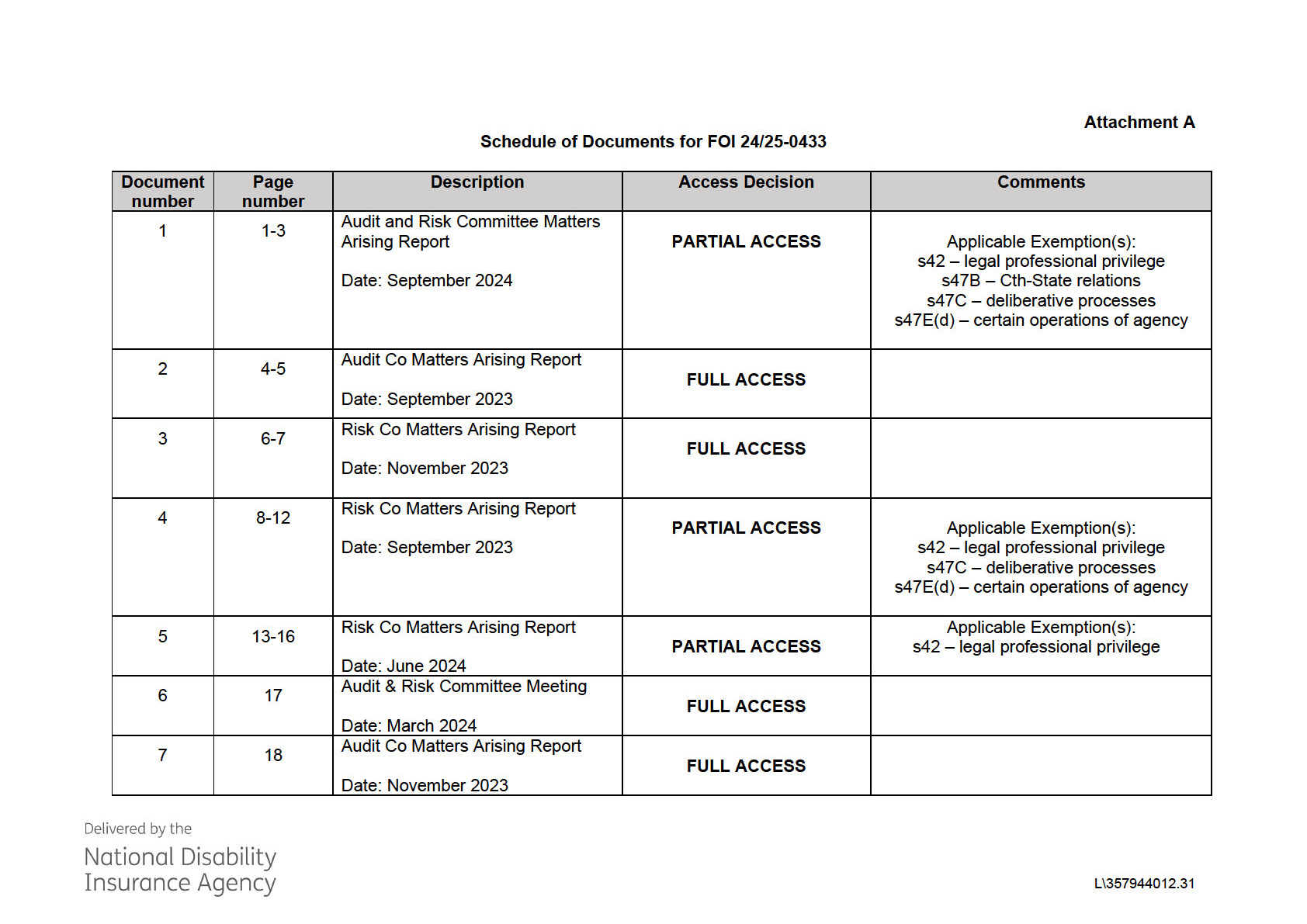
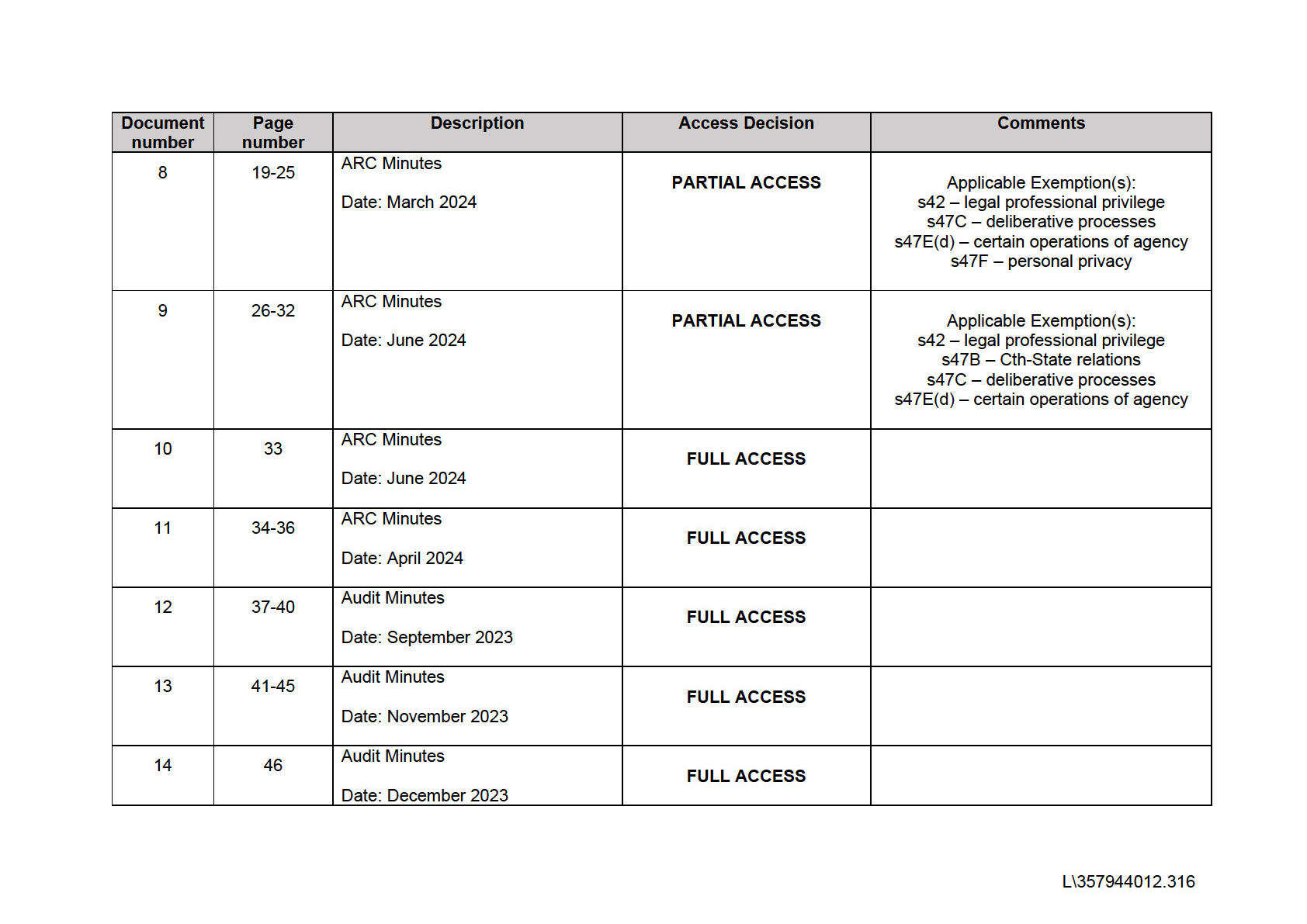
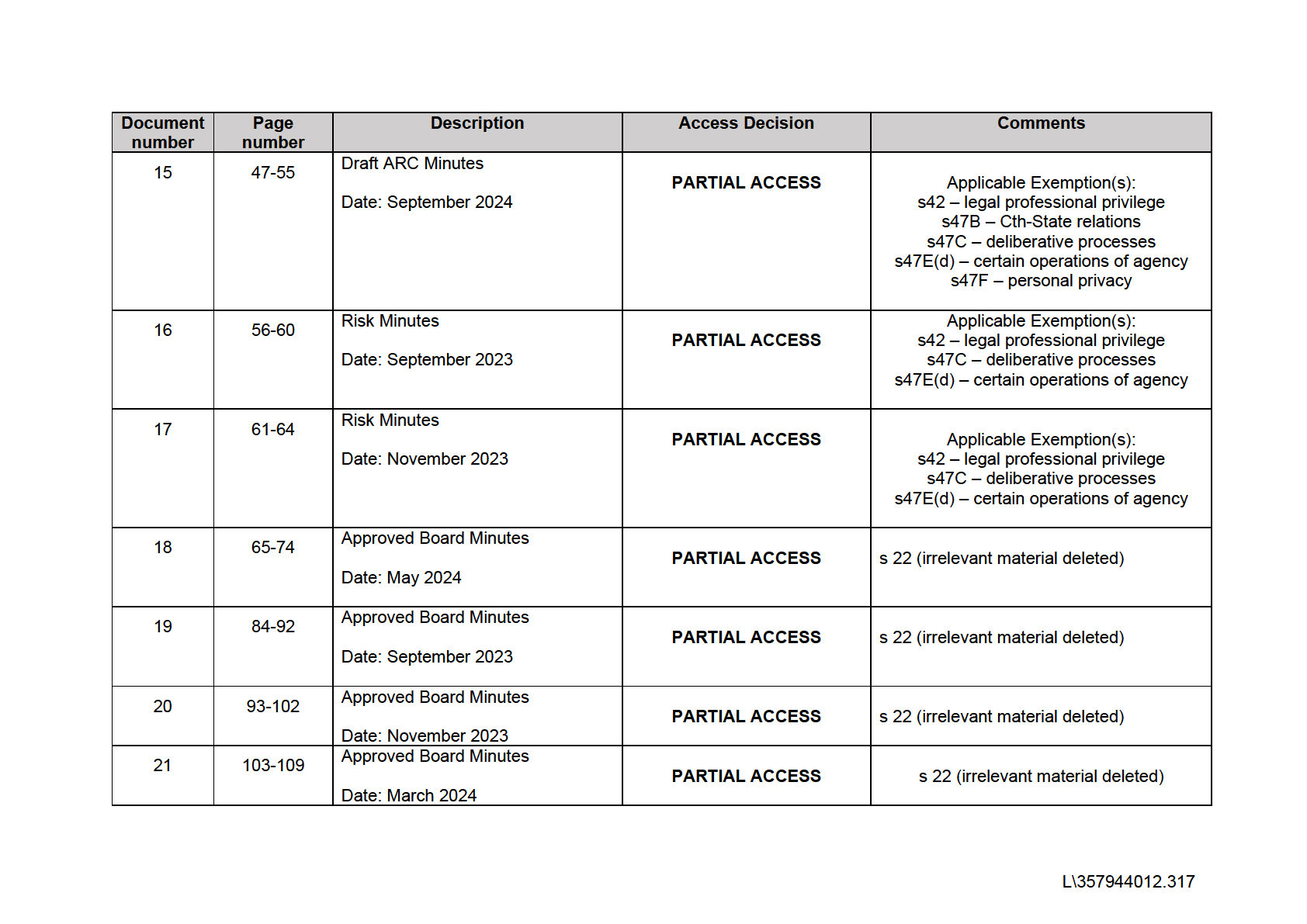
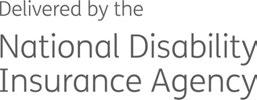 Attachment B
Your review rights
Attachment B
Your review rights
As this matter was a deemed refusal, internal review of this decision is not an option.
However, if you have concern with any aspect of this decision, please contact the NDIA FOI
team by email xxx@xxxx.xxx.xx or by post:
Freedom of Information Section
Complaints Management & FOI Branch
General Counsel Division
National Disability Insurance Agency
GPO Box 700
CANBERRA ACT 2601
Review by the Office of the Australian Information Commissioner
In circumstances where the Agency's deemed refusal decision was made more than 60 days
ago and the Agency understands that to date you have not sought review by the Of ice of
the Australian Information Commissioner (OAIC) of that decision, if you wish to apply to
OAIC to seek a review of the Agency's decision, you may need to seek an extension of time
from OAIC. The FOI Guidelines provide1 that where an application for review of a deemed
refusal decision is made outside of the 60 day period, OAIC may consider an application for
review to also be an application for an extension of time to apply for OAIC review.
If you wish to have the decision reviewed by the OAIC, you may apply for the review, in
writing, or by using the online merits review form available on the OAIC’s website at
www.oaic.gov.au.
Applications for review can be lodged with the OAIC in the following ways:
Online: www.oaic.gov.au
Post:
GPO Box 5218, Sydney NSW 2001
Email:
xxxxxxxxx@xxxx.xxx.xx
Phone:
1300 363 992 (local call charge)
Complaints to the Office of the Australian Information Commissioner or the
Commonwealth Ombudsman
You may complain to either the Commonwealth Ombudsman or the OAIC about actions
taken by the NDIA in relation to your request. The Ombudsman wil consult with the OAIC
before investigating a complaint about the handling of an FOI request.
Your complaint to the OAIC can be directed to the contact details identified above. Your
complaint to the Ombudsman can be directed to:
Phone: 1300 362 072 (local call charge)
Email:
xxxxxxxxx@xxxxxxxxx.xxx.xx
Your complaint should be in writing and should set out the grounds on which it is considered
that the actions taken in relation to the request should be investigated.
1 [10.48] of the FOI Guidelines.
L\357944012.31






